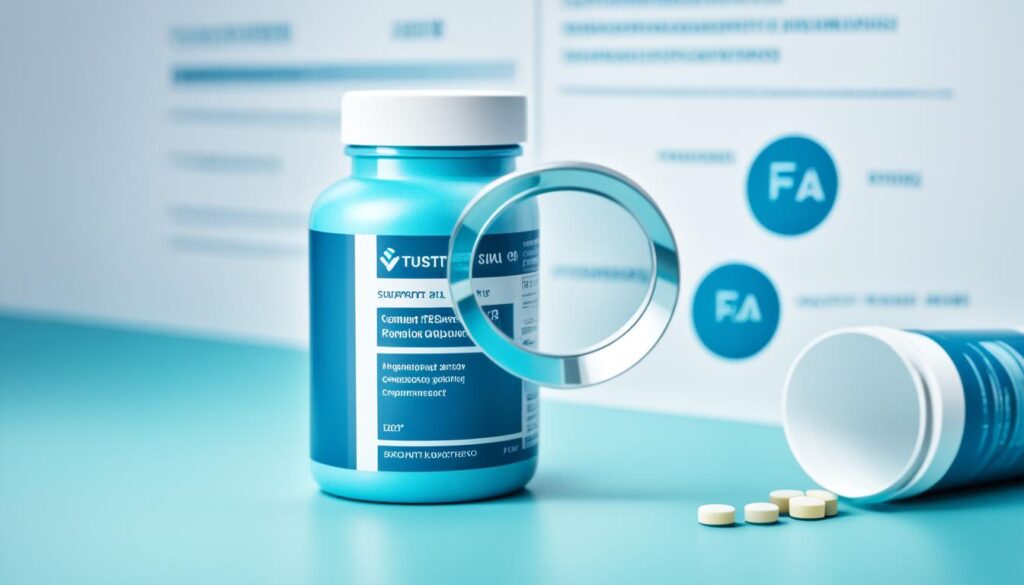In the United States, many adults and kids take vitamins or other supplements. These supplements can have minerals, herbs, amino acids, and more. They come in many forms like tablets, capsules, gummies, and powders.
Some popular supplements are vitamins D and B12, minerals like calcium and iron, and herbs like echinacea and garlic. Others include glucosamine, probiotics, and fish oils. The FDA watches over dietary supplements as foods, not drugs. The labels might say they help with health, but they can’t say they cure or prevent diseases.
Key Takeaways : Dietary Supplements For Better Health
- Dietary supplements are regulated by the FDA as foods, not drugs, and their labels can make claims about health benefits.
- Supplements come in many forms, including tablets, capsules, gummies, powders, drinks, and energy bars.
- Popular supplements include vitamins, minerals, herbs, probiotics, and omega-3 fatty acids.
- Supplements cannot claim to cure, treat, or prevent any disease, unlike medications.
- It’s important to talk to a healthcare provider before taking any dietary supplements, especially if you have a medical condition or take prescription medications.
What Are Dietary Supplements?
Dietary supplements are products made to add to your diet. They give you extra nutrients, minerals, or substances. These supplements help with health and well-being. They come in many forms like tablets, capsules, gummies, powders, drinks, and energy bars.
These forms make it easy to get important vitamins, minerals, herbs, and other nutrients that might be missing from your diet.
Types and Forms of Dietary Supplements
Dietary supplements come in many forms to fit what people like and need. Here are some common types:
- Tablets and capsules – These are the most common and easy to swallow.
- Gummies – These are popular, especially for kids and those who like a fun, chewable option.
- Powders – These can be mixed into drinks or food for easy use.
- Liquids and drinks – These are quick and easy to absorb.
- Energy bars – These bars are a convenient way to get energy and support.
Popular Dietary Supplements
Some dietary supplements are very popular and well-studied. Here are a few:
- Vitamin D – Important for bone and immune health.
- Vitamin B12 – Needed for energy, making red blood cells, and brain function.
- Calcium – Keeps bones and teeth strong.
- Iron – Helps make hemoglobin and prevent anemia.
- Echinacea – May help boost the immune system and lessen cold symptoms.
- Garlic – May help with heart health and reduce inflammation.
- Glucosamine – Supports joint health and may ease osteoarthritis symptoms.
- Probiotics – Helps keep the gut healthy and supports digestion and immunity.
- Fish oil – Full of omega-3 fatty acids, good for the heart, brain, and overall health.
Dietary supplements can be a big help for health and wellness. But, it’s key to talk to a healthcare professional. They can help pick the right supplements for you and make sure they’re safe and work well.
The Dietary Supplement Label

Buying dietary supplements can seem overwhelming with so many choices. But, knowing what’s on the label can help you pick the right ones for your health. It’s like reading a map to your wellness goals.
The Supplement Facts label shows you the active ingredients, how much you get per serving, and other stuff like fillers and flavorings. The label also tells you the serving size. But, your doctor might say you need more or less based on your health.
| Label Element | Description |
|---|---|
| Active Ingredients | The main parts of the supplement that give you the benefits you want. |
| Serving Size | The amount of the supplement you should take each time. |
| Other Ingredients | Stuff like fillers, binders, and flavorings added for different reasons. |
Looking at the dietary supplement label and supplement facts helps you understand what’s in the product. This way, you can choose if it fits your health goals and needs.
“Understanding the information on the supplement label is the first step in ensuring you’re choosing a quality product that is safe and effective for your individual needs.”
Effectiveness of Dietary Supplements

Dietary supplements can be helpful if you don’t eat a balanced diet. They can fill in the gaps for essential nutrients. But, they shouldn’t replace eating a variety of dietary guidelines for americans and myplate-recommended foods.
Some dietary supplements can improve health and help with specific conditions. For example, calcium and vitamin D keep bones strong and prevent bone loss. Folic acid lowers the risk of certain birth defects. Omega-3 fatty acids from fish oils are good for people with heart disease. And the AREDS formula (with vitamins C and E, zinc, copper, lutein, and zeaxanthin) can slow vision loss in those with age-related macular degeneration.
Supplements That May Provide Benefits
- Calcium and vitamin D for strong bones
- Folic acid to reduce the risk of birth defects
- Omega-3 fatty acids for heart health
- AREDS formula for age-related macular degeneration
Many other dietary supplements need more research to prove their benefits. Always talk to a healthcare provider before taking any dietary supplements to make sure they’re safe and right for you.
Safety and Risk of Dietary Supplements

Dietary supplements can offer many health benefits. But, it’s key to know the risks and safety issues they can bring. Many supplements have strong ingredients that can affect the body. Taking them wrong or mixing them with other medicines can cause bad side effects.
Potential Side Effects and Interactions
One big worry with dietary supplements is the chance of side effects. This is true especially if taken too much or instead of medicines from a doctor. Some supplements might make bleeding more likely or change how the body reacts to surgery anesthesia.
Also, some supplements, like warfarin and St. John’s wort, can mix badly with many medicines. This includes antidepressants, birth control pills, heart medications, anti-HIV medications, and transplant drugs. This can make these medicines not work right or cause bad reactions.
Another issue is that antioxidant supplements, like vitamins C and E, might mess with some chemotherapy treatments. Taking too much of some nutrients, like vitamin A or iron, can also cause problems.
“It’s important to be cautious when taking dietary supplements, as they can have powerful effects on the body and may interact with medications in ways that can be harmful.”
The risks of dietary supplements show why it’s key to talk to healthcare providers. Keeping track of all supplements and medicines is also important. Knowing about possible side effects and interactions helps people make safe choices with supplements.
Quality of Dietary Supplements
Quality is key when it comes to dietary supplements. The FDA sets Good Manufacturing Practices (GMPs) for companies. These rules make sure products are safe and reliable.
They prevent wrong ingredients, bad dosages, and contamination. This makes dietary supplements safer for everyone.
Good Manufacturing Practices (GMPs)
The FDA checks on supplement factories to follow these GMPs. This ensures that what you buy is what it says it is. And it’s free from harmful stuff.
Independent Quality Testing Organizations
Groups like ConsumerLab.com, NSF International, and U.S. Pharmacopeia also check supplement quality. They give a seal of quality assurance to products that pass their tests. This seal means the supplement is made right, has the right ingredients, and is clean.
When buying supplements, look for these quality assurance seals. They mean you’re getting a top-notch product.
Dietary Supplements For Better Health

Dietary supplements can be a big help for your health and wellness. They shouldn’t replace a good diet, but they can fill in nutritional gaps for some people.
Supplements like vitamins, minerals, probiotics, and omega-3 fatty acids are studied for their health benefits. They can support your immune system, heart health, and more. But, always talk to a healthcare provider before starting any supplements.
- Vitamins and minerals: These supplements can fix deficiencies and boost your health. They include vitamins like D, calcium, and iron.
- Probiotics: These good bacteria help your digestive and immune health.
- Omega-3s: Fatty acids in fish oil may fight inflammation and support your heart.
Remember, supplements aren’t like medicines. Their quality and safety can differ a lot. Always work with healthcare providers to use supplements safely and effectively.
| Supplement | Potential Health Benefits |
|---|---|
| Vitamin D | Supports bone health, immune function, and cardiovascular health |
| Probiotics | Promotes gut health, supports immune function, and may reduce inflammation |
| Omega-3s | May help reduce the risk of heart disease and support brain health |
“Dietary supplements can be a valuable addition to a healthy lifestyle, but they should not replace a balanced, nutritious diet. It’s essential to consult with healthcare providers to determine which supplements may be appropriate and beneficial for your individual needs.”
Consulting Healthcare Providers

When exploring dietary supplements, it’s key to tell your health care team about them. This includes doctors, dentists, pharmacists, and dietitians. They can guide you on which supplements are good for your health and warn you about possible drug interactions.
Maintaining a Supplement and Medication Record
The “My Dietary Supplement and Medicine Record” tool on the Office of Dietary Supplements website is very helpful. It lets you keep track of your supplements and medicines. This way, you can share this info with your health care providers easily, ensuring you’re making the best health choices.
It’s crucial to keep this record if you’re on many dietary supplements or medicines. Your health care providers, like doctors, dentists, pharmacists, and dietitians, can check your history. They can make sure there are no bad interactions or warnings.
| Supplement | Dosage | Reason for Taking | Date Started |
|---|---|---|---|
| Vitamin D | 2,000 IU | Bone health | January 1, 2022 |
| Omega-3 Fish Oil | 1,000 mg | Heart health | March 15, 2021 |
| Probiotic | 30 billion CFU | Digestive health | September 1, 2020 |
Sharing your dietary supplement and medicine record with your health care providers is proactive. It helps you and your team create a plan that supports your health and happiness.
Important Considerations for Dietary Supplements

When looking at dietary supplements, be careful. Even if they say they are “natural,” they might not be safe. Think about the chemical makeup, preparation, and how they might affect your health conditions, medications, and life stages like pregnancy, breastfeeding, and childhood.
Remember, side effects and bad reactions to dietary supplements can happen. If you notice any bad effects, tell your doctor right away. Just because a supplement is easy to get doesn’t mean it’s safe for everyone.
For your safety, look into the supplements you want to try. Talk to your doctor and watch how your body reacts. Being informed helps you make smart choices about adding dietary supplements to your health routine.
| Consideration | Explanation |
|---|---|
| Chemical Makeup | The specific chemical composition of a dietary supplement can have a significant impact on its potential effects and safety. |
| Preparation | The way a dietary supplement is prepared, including the manufacturing process and ingredients used, can influence its safety and effectiveness. |
| Interactions | Dietary supplements can potentially interact with certain health conditions, medications, and stages of life, such as pregnancy, breastfeeding, and childhood. |
| Side Effects | Dietary supplements can cause side effects or even bad reactions in some individuals, which should be closely monitored and reported to a healthcare provider. |
“Just because a supplement is promoted as ‘natural’ doesn’t necessarily mean it’s safe. It’s important to be cautious and do your research.”
Federal Regulation of Dietary Supplements

In the United States, the Food and Drug Administration (FDA) and the Federal Trade Commission (FTC) regulate the dietary supplement industry. These supplements don’t need FDA approval before they hit the market. But, companies must make sure their products are safe and their labels are correct.
FDA and FTC Oversight
The FDA keeps an eye on dietary supplements and can act if companies make false claims. It can remove dangerous supplements and send warning letters for rule-breaking. The FTC looks at how supplements are advertised, making sure claims are true and backed up.
Supplement labels can make health claims but must say the FDA hasn’t checked them. They also say the product isn’t meant to treat any diseases. This is key because supplements are seen as food, not medicine.
| Regulatory Agency | Primary Responsibilities |
|---|---|
| FDA (Food and Drug Administration) |
|
| FTC (Federal Trade Commission) |
|
The federal rules for dietary supplements balance consumer access with safety. They make companies responsible for their products’ quality and truthfulness.
Government Information Sources on Dietary Supplements

Looking for trustworthy info on dietary supplements? Check out government agencies and well-known groups. They offer a lot of info to help you choose the right supplements.
The National Institutes of Health (NIH) is key in funding research and sharing info on dietary supplements. The Office of Dietary Supplements (ODS) and the National Center for Complementary and Integrative Health (NCCIH) focus on this health topic.
The National Library of Medicine’s Medline Plus and PubMed are great for info on dietary supplements. They give you the latest research and advice backed by science.
The U.S. Food and Drug Administration (FDA) makes sure dietary supplements are safe. They share info on how they watch over the industry, keeping consumers safe.
Using these government information sources, you can find reliable, current, and fair advice on dietary supplements. This helps you make choices that are good for your health.
“Dietary supplements can be a valuable addition to a healthy lifestyle, but it’s important to research and consult healthcare professionals to ensure safe and effective use.”
Vitamins and Minerals: Essential Nutrients
Vitamins and minerals are key for good health. They help with bone strength, immune function, heart health, and digestion. These nutrients are important for a balanced diet.
Vitamin D, Probiotics, and Multivitamins
Vitamin D is vital for strong bones. It might also lower the risk of some health issues. Probiotics support digestion and immune health. But, more research is needed on their benefits.
Multivitamins can fill nutritional gaps. But, they shouldn’t replace a healthy diet.
Folic Acid, Fiber, and Omega-3s
Folic acid prevents birth defects in babies. Fiber and omega-3s from fish oils help the heart. It’s key to talk to health experts to see what vitamins, minerals, and supplements you need.
| Nutrient | Key Benefits |
|---|---|
| Vitamin D | Supports bone health, may be associated with reduced risk of certain health conditions |
| Probiotics | Supports digestive health, immune function, and other areas of well-being |
| Folic Acid | Essential for preventing birth defects in babies |
| Fiber | Promotes heart health and other benefits |
| Omega-3s | Supports heart health and offers additional benefits |
“Vitamins and minerals are the unsung heroes of our bodies, working tirelessly behind the scenes to keep us healthy and thriving.”
Also Read : The Importance Of Regular Exercise For Health
Conclusion
Dietary supplements can be helpful for health and wellness, but they should be used wisely. They can’t replace a diet full of nutrients. It’s important to know the risks and quality of supplements.
Talking to doctors, pharmacists, and dietitians can help pick the right supplements. This way, supplements can meet your health needs safely. It helps avoid risks and make the most of their benefits.
Using supplements in a smart way, along with a healthy lifestyle, helps you take charge of your health. Open talks with healthcare providers are key to a successful health journey.
FAQs
Q: What are dietary supplements?
A: Dietary supplements are products taken orally that contain ingredients like vitamins, minerals, herbs, amino acids, or enzymes. They are intended to supplement the diet and provide additional nutrients.
Q: Can dietary supplements help improve my health?
A: Dietary supplements can help to maintain or improve your health when combined with a well-balanced diet. However, they should not take the place of the variety of healthy foods that are important for a healthy diet.
Q: Are there any risks associated with taking dietary supplements?
A: While dietary supplements can provide benefits, it’s important to be alert to the possibility of a bad reaction. Some supplements can contain ingredients that can have strong effects on the body, so it’s crucial to talk with your health care provider before starting any new supplement.
Q: How do I know if a dietary supplement is safe?
A: It’s important to choose supplements from reputable supplement companies and to look for products that have been tested for safety. Consulting with a registered dietitian or health care provider can also help ensure you’re making safe choices.
Q: Can I take multiple dietary supplements at once?
A: While it’s possible to take multiple supplements, it’s essential to be mindful of potential interactions between different supplements or medications. Consulting with a health care provider can help prevent any negative reactions.
Q: Are botanical dietary supplements safe to use?
A: Botanical dietary supplements can contain active ingredients that may have potent effects on the body. It’s crucial to be aware of the potential risks and benefits of botanical supplements and to discuss any concerns with your health care provider.
Q: How do dietary supplements differ from medications?
A: Dietary supplements are not intended to diagnose, treat, cure, or prevent any disease, unlike medications. Supplements are meant to supplement the diet, while medications are prescribed to address specific health concerns.
Source Links
- https://ods.od.nih.gov/factsheets/WYNTK-Consumer/
- https://www.webmd.com/vitamins-and-supplements/ss/slideshow-supplements-myths-facts
- https://newsinhealth.nih.gov/2013/08/should-you-take-dietary-supplements








Leave A Comment